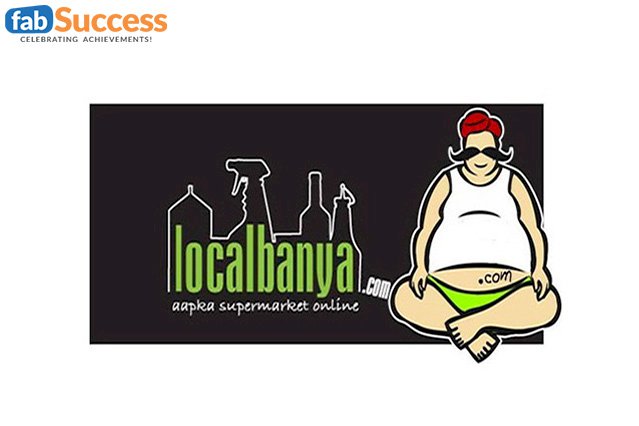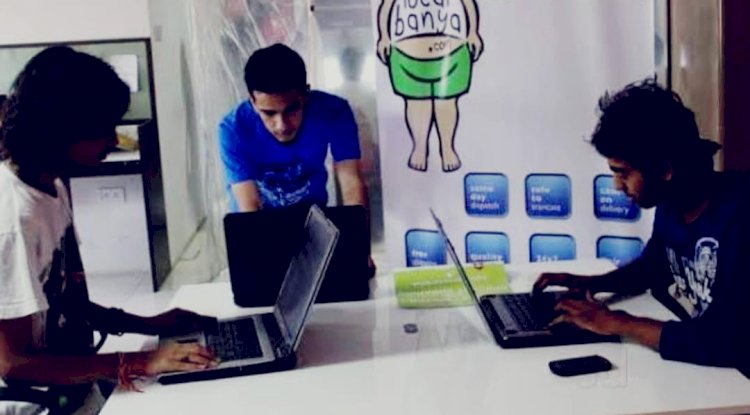25 Times Failed Startup - Local Banya Inspiring Success Story
Behind the establishment of Local Baniya, the sole purpose is to resolve the hustle and bustle of this chaotic life. Purchase everything that you need from local banya. The trio of friends, Karan Mehrotra, Amit Naik, and Rashi Choudhary dared to waddle against the notions of online grocery marketing and launched www.localbanya.com, Mumbai’s first online grocery store in May 2012.
By Faber

It wouldn’t be wrong to say that everything is going digital in this age. Most of all are the booming online market. Almost everything seems to be up for grabs on online stores. But, the one thing that still hadn’t jumped the bandwagon was groceries.
The margins are relatively lower; it takes a lot of effort just to break even. The logistics are harrowing and the stocks and inventory especially of the perishable items can be a pain. However, this started to change when LocalBanya found a way to tap into the market.
As of now, only 1% of the grocery that is bought by Indians is done online, translating into a rough estimate of 5 billion dollars. It is expected to go even higher by 2020, almost double the existing percentage.
Entrepreneurship
The trio of friends, Karan Mehrotra, Amit Naik, and Rashi Choudhary dared to waddle against the notions of online grocery marketing and launched www.localbanya.com, Mumbai’s first online grocery store in May 2012.
The initiative was spearheaded by Karan Mehrotra, a computer engineer, who happened to be involved with commerce from the early stages of his life. His family business included distribution and catering services which helped him gain an insight into the market and roused his interest. After some time he involved his friends Amit Naik and Rashi Choudhary in the venture.
Research all the way
Now, as the saying goes, research before you create, these three pretty much hit the target spot on. They spend about a year just researching all the hows, the whys and the whats of the business. They set about researching their target audience, the problems people faced with local grocery stores.
Moreover, extensive research was also done on the problem and failures of similar business models that existed currently and how they tapped into the market. This research helped them gain valuable insight into the business and they improved their idea.

Once their ideas had been finalized they launched their site. They did this just with an initial investment of 70 lakhs, most of which they spent in investing for their server. This initial investment was from their personal savings.
The business model- what exactly they did differently.
Their research had shown that it was nigh impossible for a startup to have such a huge inventory where they would be able to store these items. So, they came up with an idea and decided to do tie-ups with the local wholesalers and distributors. They also kept a small inventory for some items. It helped them save up to 70% of capital investment. This strategy panned out and they were effectively able to sustain their business.
The good profitable stuff
Their business has been growing strong ever since. In about a year they had five thousand customers who would do their shopping here. They would get on an average of a hundred orders daily.
These figures saw jumps and by 2013 they got up to four hundred orders per day, their desired targets, and increased their tempo fleets to twenty in Mumbai.
Not everything was perfect

They did have some hiccups in the initial stages:
- A web site that would be user friendly and be able to function smoothly with all that traffic was a challenge. And to improve upon that you would need a team that would share your viewpoint and would share the same kind of passion as you would.
- Vendors aren’t easily convinced, especially if you are a startup. Ensuring that they don’t low ball you would also be a challenge.
- And it can be a real game-changer. But how does one market with a pea-sized budget? Only social media and word of mouth among friends and friends of friends to get it all started.
- Finding the right set of people to aid you and work just as passionately for your business. A team that would be just as dedicated to working even with lower salaries.
These problems exist for every startup but if you are dedicated and believe in your dream, you will surely succeed. And this is what local banya achieved.

Killing the competition
The site offers great deals and bargain prices that help them gain an edge over other stores, even offline stores. Additional discounts are also given due to the fact that they save costs on inventory, which they pass on to the buyers.
They have a strong customer-driven service policy, where they try to provide the best services for their customers, be it reaching on time or finding not so easy to find perishable items.
Expanding Business
Local banya was able to manage to raise a capital worth 5 million US dollars from Karmvir Avant Group in January 2014. They got beyond 10,000 registered users in 2014. Not only this, but their daily orders also rose up to six hundred orders daily.
A high percentage, bordering on the range of 98, in punctuality ensured customer loyalty and trust. They garnered over one crore INR in sales in the first quarter of 2013. A hundred thousand likes on their page on Facebook is proof of their ever-rising popularity. Total revenues have exceeded ten million US dollars and have managed to break even in their operations in Mumbai. They have expanded operations into four major cities that are Delhi, Pune, Hyderabad, and Mumbai.
What's Your Reaction?



















